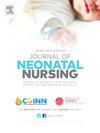Quality of life among parents of newborns at the end-of-life situation who admitted to the neonatal intensive care units: A cross-sectional study
Q2 Nursing
引用次数: 0
Abstract
Objective
This study aims to assess the quality of life for parents with a newborn in the neonatal intensive care unit in an end-of-life situation and to investigate the relationship between predictive factors affecting their quality of life.
Designs and methods
A cross-sectional descriptive study was conducted in three different hospitals in Amman, namely, 1) Al-Bashir, 2) Queen Rania Hospital, and 3) King Al Hussein Hospital. A total of 108 eligible parents were included in this study. Data were collected using a two-part questionnaire. The first part of the questionnaire measured the socio-demographic characteristics of the parents and their newborns, while the second part used the World Health Organization Quality-of-Life Scale to assess the quality-of-life level.
Results
The overall perception of the quality of life of parents had a mean of 59.95 (moderate), while the overall perception of health had a mean of 68.52 (high). The results indicated that there are statistically significant differences between fathers and mothers in the overall perception of quality of life (P = 0.003); the differences favor fathers, with a mean of 67.13. The study found only a relationship between gender as a predictive factor and overall perception of quality of life (P = 0.018). However, no relationship was found between educational level, age, family income, and overall perception of quality of life.
Conclusion
The study shows disparities in parental perceptions of neonates in end-of-life situations in neonatal critical care units. A moderately average quality of life was noted, influenced by emotional stress and difficult decisions.
Practical implications
As the parents of newborns admitted to the neonatal intensive care unit have poor quality of life, healthcare strategies need to be prioritized to maintain parents' health and well-being and enhance their ability to cope with this situation.
进入新生儿重症监护病房的新生儿父母生命末期的生活质量:一项横断面研究
本研究旨在评估新生儿重症监护室中的新生儿父母在生命末期的生活质量,并调查影响其生活质量的预测因素之间的关系。设计与方法在安曼的三家不同医院(1)巴希尔医院、2)拉尼亚王后医院和 3)侯赛因国王医院进行了横断面描述性研究。共有 108 名符合条件的家长参与了这项研究。数据收集使用了一份由两部分组成的调查问卷。问卷的第一部分测量了父母及其新生儿的社会人口学特征,第二部分则使用世界卫生组织的生活质量量表来评估生活质量水平。结果表明,在对生活质量的总体感知方面,父亲和母亲之间存在统计学意义上的显著差异(P = 0.003);差异有利于父亲,平均值为 67.13。研究仅发现性别作为预测因素与总体生活质量感之间存在关系(P = 0.018)。结论该研究显示了新生儿重症监护室中父母对处于生命末期的新生儿的看法存在差异。实际意义由于新生儿重症监护室的新生儿父母的生活质量较差,因此需要优先考虑医疗保健策略,以维护父母的健康和福祉,并提高他们应对这种情况的能力。
本文章由计算机程序翻译,如有差异,请以英文原文为准。
求助全文
约1分钟内获得全文
求助全文
来源期刊

Journal of Neonatal Nursing
Nursing-Pediatrics
CiteScore
2.00
自引率
0.00%
发文量
143
期刊介绍:
Aims & Scope: This is the practical, bimonthly, research-based journal for all professionals concerned with the care of neonates and their families, both in hospital and the community. It aims to support the development of the essential practice, management, education and health promotion skills required by these professionals. The JNN will provide a forum for the exchange of ideas and information between the range of professionals working in this field; promote cooperation between these professionals; facilitate partnership care with families; provide information and informed opinion; promote innovation and change in the care of neonates and their families; and provide an education resource for this important rapidly developing field.
 求助内容:
求助内容: 应助结果提醒方式:
应助结果提醒方式:


